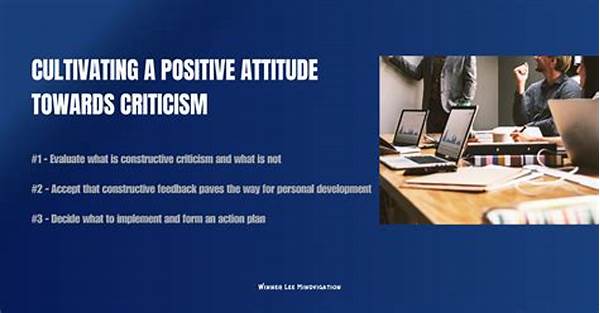Feedback is an essential part of personal and professional growth, yet it often carries a negative connotation. Many people tend to perceive feedback as criticism rather than an opportunity for improvement. Cultivating a positive mindset towards feedback can transform how we receive and act on the insights shared by others. Embracing this mindset not only enhances our growth but also builds resilience and self-awareness, both of which are valuable assets in any aspect of life. By viewing feedback as a tool for development rather than a personal affront, we open ourselves up to a world of opportunities that hinge on constant learning and improvement.
Understanding the Value of Feedback
To truly embrace the practice of cultivating a positive mindset towards feedback, it’s essential to understand its value. Feedback isn’t just about criticism; it’s an opportunity to gain insight into how others perceive our work and behavior. This understanding can be instrumental in helping us refine our skills, build stronger relationships, and achieve our goals. By acknowledging feedback as a valuable resource, we become more equipped to navigate the complexities of personal and professional challenges, ultimately leading to a more fulfilling life.
Approaching feedback with an open mind requires a conscious shift in perspective. Instead of reacting defensively, we begin to view feedback as a chance to grow and learn. This shift not only improves our relationship with feedback but also enhances our emotional intelligence. When we cultivate a positive mindset towards feedback, we become more adaptable, open to change, and ready to embrace new challenges with confidence.
Tips for Cultivating a Positive Mindset Towards Feedback
1. Embrace Curiosity: Approach feedback with a sense of curiosity. Instead of fearing criticism, view it as a chance to learn something new about yourself.
2. Separate Feedback from Self-worth: Understand that feedback is not a reflection of your entire being. It’s simply an assessment of specific actions or behaviors at a given time.
3. Focus on Growth: Shift your focus from past mistakes to future improvements. Use feedback as a roadmap to guide your personal development.
4. Seek Constructive Feedback: Proactively ask for feedback from diverse sources to gain a well-rounded view of your strengths and areas for improvement.
5. Practice Gratitude: Appreciate the effort someone has taken to provide you with feedback. This gratitude can turn feedback into a rewarding experience.
Developing a Feedback-Friendly Environment
Fostering an environment that encourages feedback is crucial for both personal and professional settings. When leaders and team members prioritize cultivating a positive mindset towards feedback, they create a culture where everyone feels valued and heard. In such an environment, individuals are more likely to share their thoughts and opinions, which can lead to innovative solutions and improved problem-solving.
Leading by example plays a significant role in this transformation. When leaders demonstrate openness to feedback and model a positive approach, they inspire their team members to do the same. Encouraging regular feedback sessions and creating safe spaces for open conversations further cements this positive environment. With consistent practice, the organization or team can experience significant growth, driven by continuous learning and a shared commitment to improvement.
Addressing Challenges in Feedback Acceptance
Cultivating a positive mindset towards feedback is not without its challenges. It’s natural to feel vulnerable when receiving feedback, especially if it’s not entirely positive. However, learning to manage these emotions is part of the growth process. Recognizing that everyone has areas to improve can make feedback feel less daunting.
Moreover, it’s important to remember that not all feedback will be equally valuable. Developing the discernment to distinguish between constructive feedback and unproductive criticism is crucial. By focusing on actionable feedback and letting go of negative emotions, we ensure that feedback serves its purpose as a tool for growth.
The Power of Feedback in Personal Growth
Feedback is a powerful catalyst for personal growth. By cultivating a positive mindset towards feedback, we reshape the narrative around performance evaluation. Instead of dreading feedback, we come to anticipate the valuable insights it can provide. This anticipation creates a proactive attitude towards self-improvement.
Engaging with feedback productively requires practice and patience. Over time, as we integrate feedback into our growth strategies, we build a foundation of continuous development. Each piece of feedback becomes a stepping stone towards becoming the best version of ourselves. This commitment to personal growth has far-reaching impacts, from boosting our confidence to enhancing our career prospects.
Reflecting on the Importance of Feedback
In summary, cultivating a positive mindset towards feedback is an essential skill that can transform how we perceive and respond to the opinions of others. This mindset shift not only improves our ability to accept feedback but also enhances our overall attitude towards learning and development.
By approaching feedback with curiosity, gratitude, and a focus on growth, we unlock the potential to achieve greater success and fulfillment. Embracing feedback as a valuable tool encourages a continuous cycle of improvement that supports both personal and professional endeavors, leading to a more enriched and balanced life.
